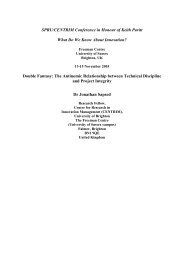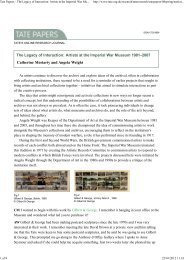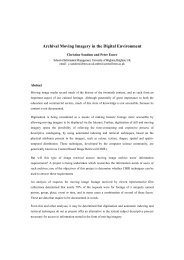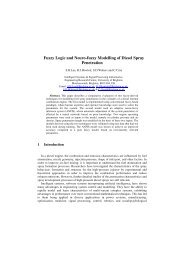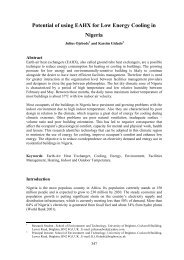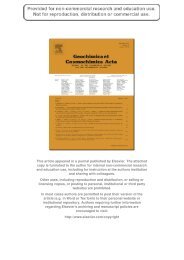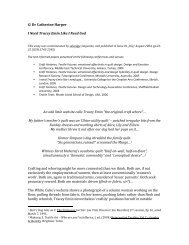NESTA Crime Online - University of Brighton Repository
NESTA Crime Online - University of Brighton Repository
NESTA Crime Online - University of Brighton Repository
Create successful ePaper yourself
Turn your PDF publications into a flip-book with our unique Google optimized e-Paper software.
Executive Summary<br />
With the growing sophistication and use <strong>of</strong> information technology, the past decade has<br />
seen a major growth in cybercrime. Broadly described, cybercrime refers to all types <strong>of</strong><br />
crime that exploit modern telecommunications networks, in which computers or<br />
computer networks are used for criminal activity.<br />
This report focuses exclusively on financial cybercrime, specifically credit card fraud and<br />
identity theft. Of course, there are other forms <strong>of</strong> cybercrime ranging from paedophile<br />
networks to denial <strong>of</strong> service operations that are beyond the scope <strong>of</strong> this study.<br />
Financial cybercrime has increased dramatically in recent years and looks set to increase<br />
further as the proliferation <strong>of</strong> communications technology proceeds apace and reaches<br />
regions <strong>of</strong> the world with many underemployed poor people with information technology<br />
skills who can take advantage <strong>of</strong> cybercrime opportunities. The current global recession<br />
will likely increase this trend still further.<br />
Information and Data<br />
The reporting <strong>of</strong> cybercrime and related issues has grown significantly in recent months.<br />
Without exception, every week sees media reports <strong>of</strong> large-scale cybercrime activities.<br />
Recent reports have included:<br />
! A million people may be phishing scam victims (Telegraph.co.uk, 7 th March 2009)<br />
! Spam rises 150 per cent in two months (Australian IT, 8 th March 2009)<br />
! Worm infects millions <strong>of</strong> computers worldwide (The New York Times, 28 th January<br />
2009)<br />
! Cyber scams on the up in the downturn (The Australian Business with the Wall<br />
Street Journal, 30 th January 2009)<br />
! Cybercrime wave sweeping Britain (BBC News, 30 th October 2008)<br />
! Businesses risk $1 trillion losses from data theft (The Washington Post, 30 th<br />
January 2009)<br />
! Russia and China accused <strong>of</strong> harbouring cybercriminals (Times <strong>Online</strong>, 12 th<br />
October 2008)<br />
Behind these sensational headlines, however, the data that fuels the current debate on<br />
the contemporary dynamics <strong>of</strong> cybercrime are far from straightforward. No reliable<br />
Page 2





